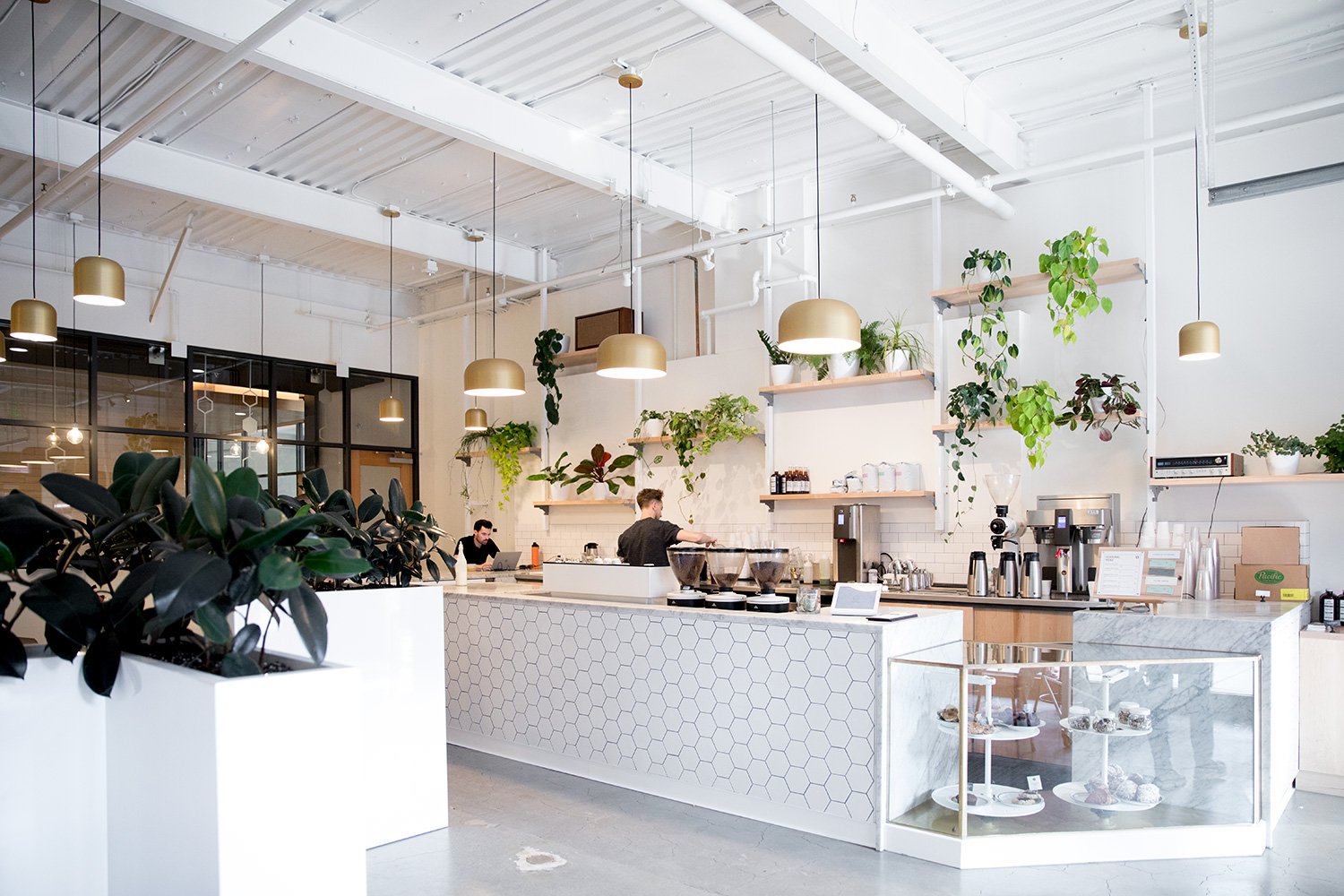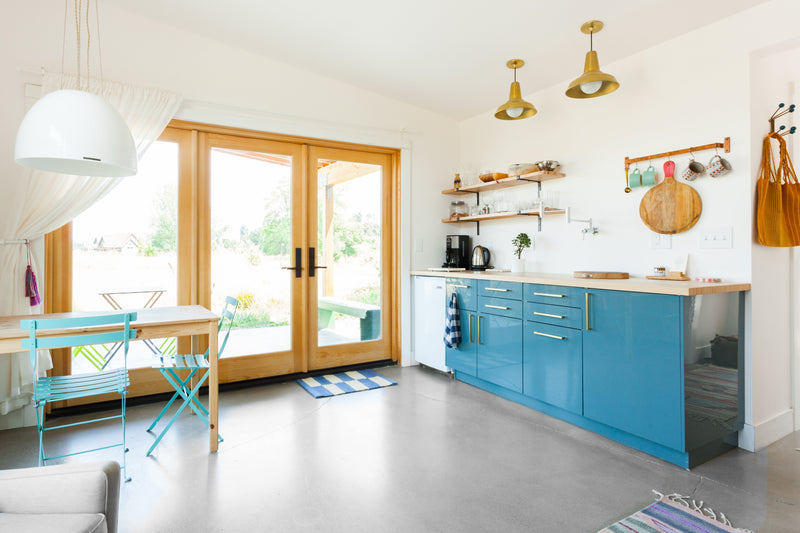Schoolhouse Spaces: Good Coffee

When Good Coffee first opened in the Richmond neighborhood of Southeast Portland in 2014, there was no question that it immediately lived up to its name. Founded by brothers Sam and Nick Purvis, both coffee industry veterans, the company started with a formidable espresso pedigree. But beyond the luxurious lattes and bracing black coffee passed over the counters each day, the café earned a reputation for being one of the most beautifully designed cafes in town.
It was also one of the most welcoming. After adding a second café on SE 12th Ave., and a third in Slabtown, the duo has continued to increase their sizeable impact on the city’s caffeine scene. We caught up with Sam to chat about his history in the industry, his love of great design, and where he’d like to travel for coffee-related business.
How did you get into the coffee industry?
"My brother and business partner Nick and I both made our way into the coffee industry years ago as a result of loving the product, the environment, and the community offered at cafes—and just simply needing a job. What kept us in the coffee industry over time was falling in love with the idea of using hospitality as way to create delight for others."
Is there a story behind the name “Good Coffee”?
"At the time, everyone was getting so serious about coffee. At certain places in the industry, there was some ego going on (although nothing different than what you see at certain places in other parts of the food and beverage industry). Don't get me wrong, we take our product seriously. But we wanted our cafes to be about more than just coffee; we wanted to use coffee as a way to create really delightful experiences for people. In the beginning, we thought we should just name the company GOOD COFFEE – like, 'yeah, it's just good coffee, no big deal.' We wanted the experience of coming into our cafes and being hosted by our team to be the thing that people really fell in love with."

You designed the first shop with an architect friend. How did that process come about and what were your original goals?
"Yeah, Ben King of Stem Architecture has been our architect of record on all three stores. He's great to work with. He really allows for so much openness when it comes to exploring layouts that improve guest experience and service flow. He'll push and suggest at times, and also accommodate at others. Jacob Flory from B.D. Mack was also so integral to how all of the custom furniture and functional design of our spaces came together. We've been really lucky to work with great makers and designers all throughout the process of building cafes. Working with Schoolhouse has been no different. We're always so inspired by the innovation and product that Schoolhouse brings to the table regarding space creation."
Many coffee shops aim to be trendy or cool, but your décor feels special. Your furniture includes pieces from The Good Mod, Stephen Kenn, and of course, Schoolhouse, among others. Why is design so important for you?
Of course, we look for pieces that inspire us, that fit our desire to inspire others and also functionally add to our ability to serve our guests. Outside of that, we look for pieces that put us in the flight path of people that we really look up to, that are doing something we believe is special."
How does Schoolhouse lighting fit into your overall design?
"It's been such a natural progression to work with Schoolhouse. The new product launches over the years have been a nice experience of both finding things we really love but also being led a bit. I think this new store is a great example of that. Our previous two stores have fixtures from Schoolhouse that play a bit more industrial, which was definitely one of the places where Schoolhouse's voice was at the time. When we were getting ready to open Slabtown, Brian really encouraged us to explore the Donna Collection and we fell in the love with the line and its more retro/modern vibe. Putting all anodized gold fixtures in this store was a little risky but it worked well with the rest of the muted tones and greenery. We're always inspired and challenged by the updates were finding at Schoolhouse.
Four years in, how have things changed? Did you do anything different opening the new Slabtown café as opposed to the original Richmond café?
"The nice thing about continuing to build stores is we've been able to see what works and what doesn't. What environments people really resonate with, what they don't. We definitely took that data and tweaked some things, while keeping other things the same. We tweaked some materials for functionality’s sake as well."

Do you see opening more cafes in the future?
"Yes. We have another cafe coming to Portland soon which we're very excited about. This will be a collaborative project for us that we're doing with friends and we're pumped to be on the team. Regarding future growth, retail is our entire focus. We're a guest-focused company. We want to create delight for our guests and so we'll stay focused on growth that keeps us connected with guests."
How did you differentiate yourself in a city as coffee-saturated as Portland?
"I feel like this is a very simple thing for us. We've always believed that if we could give someone a really great experience, one person at a time, that people would keep coming back. We just stay focused on that. As soon as we lose that, whether it be growth related or lack of focus, we've lost everything."
Do you go to other coffee shops much? What do you look for when walking into a coffee shop?
"Yes, all the time. I look for it all. I love watching how people interact with a particular cafe, a particular space. I love everything about cafes, the way they are designed, the way they feel, the coffee I get to drink, the people I run into. Our customers sometimes joke with us when they see us out at other cafes, like 'hey, what are you doing here?' But I love running into our customers at other cafes just as much as I love running into them at our stores. That's the great thing about cafes, running into people."
Finally, if you could travel anywhere on coffee-related business, where would you go and why? This could be a growing region, a city known for its café culture, or anywhere else related to coffee.
"Neither Nick or I have really traveled much for coffee, so I think we're both hungry to see how other people are doing things. We work to track these things online or being on the phone with friends who operate businesses in different environments than we do. The dream list, travel wise, would be: Italy, Australia, Germany, Japan for consuming countries; Mexico, Guatemala, Ethiopia, Colombia, Peru and Kenya for growing regions."


